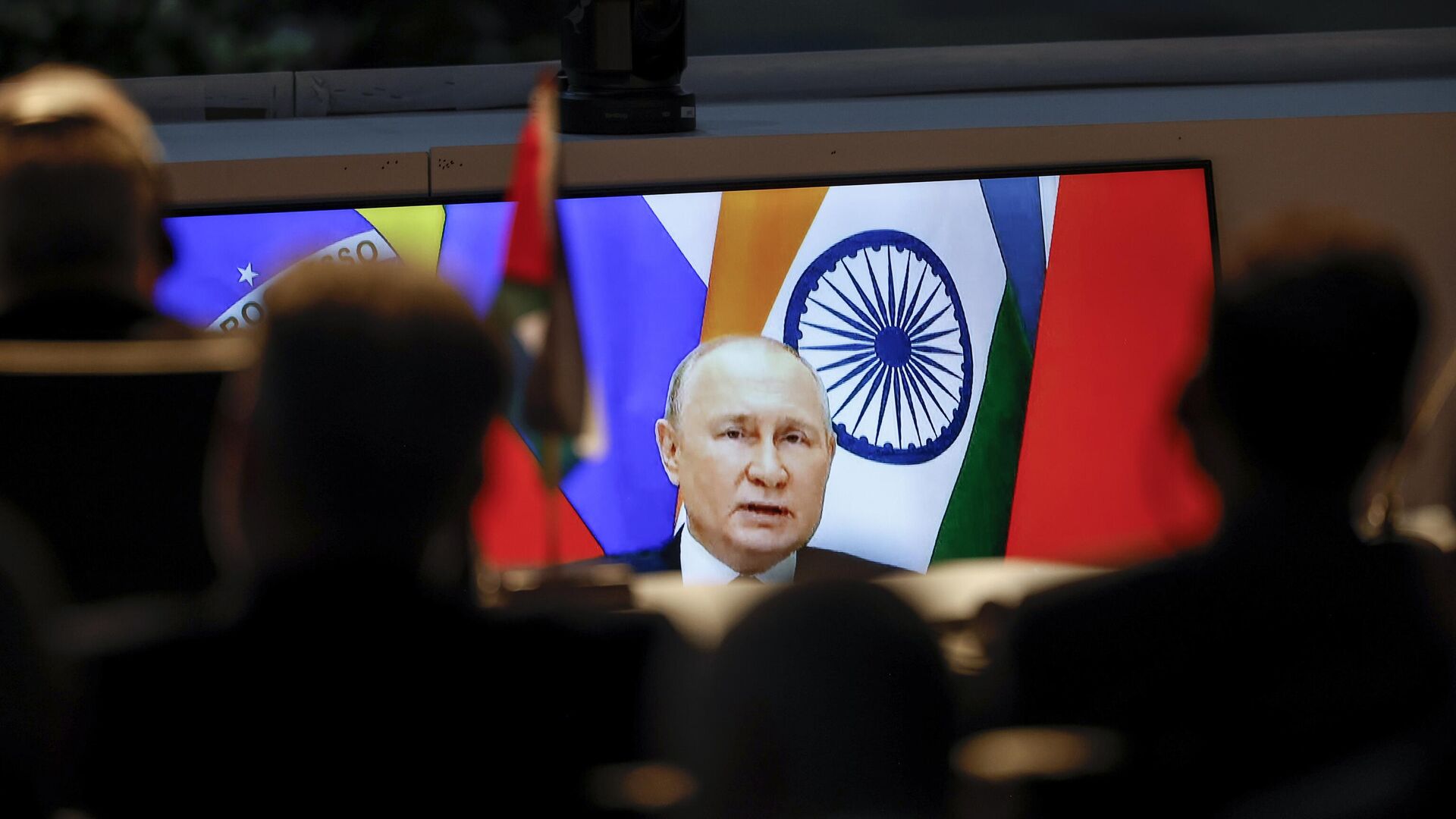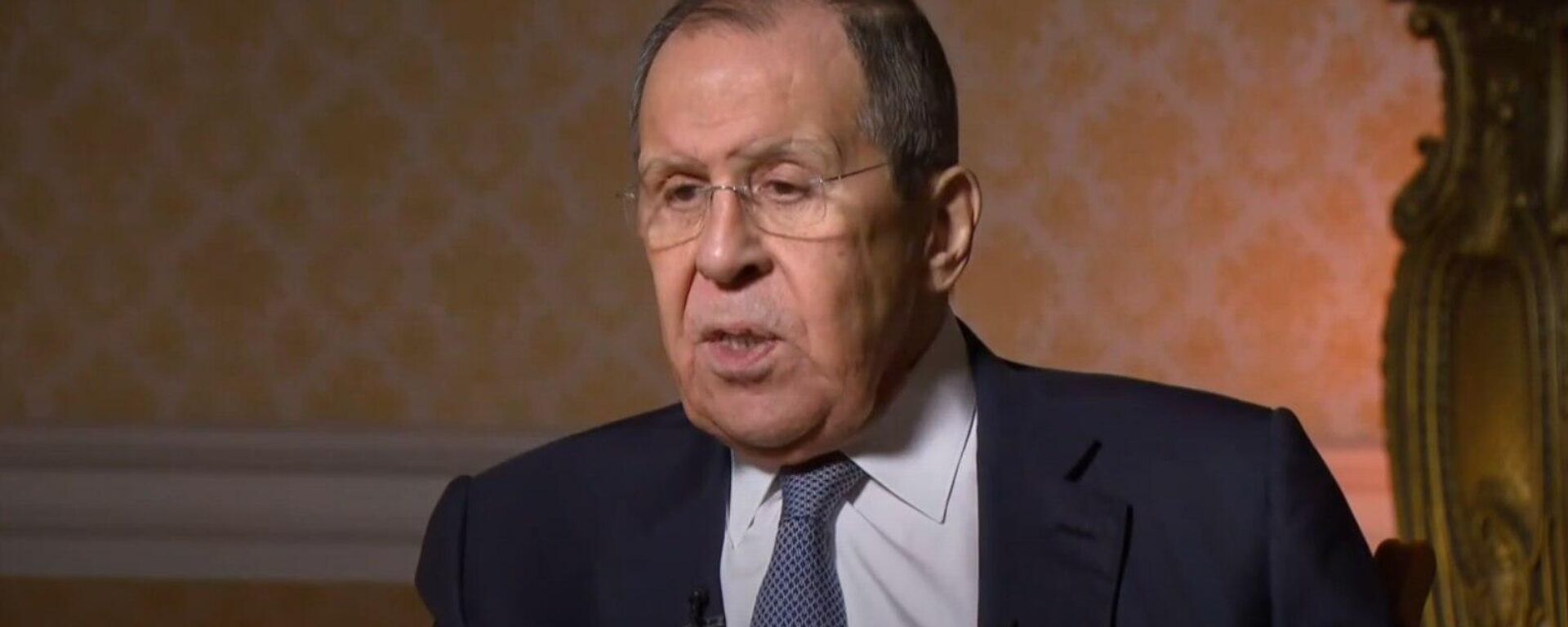https://sputniknews.in/20240102/brics-under-russias-presidency-poised-to-play-greater-role-on-global-security-issues-6061663.html
BRICS Under Russia's Presidency Poised to Play Greater Role on Global Security Issues
BRICS Under Russia's Presidency Poised to Play Greater Role on Global Security Issues
Sputnik India
As Russia assumed the rotating chair of the expanded BRICS grouping on 1 January, President Vladimir Putin outlined three priority areas for the grouping under the new chair-- politics, security, economy and finance.
2024-01-02T17:23+0530
2024-01-02T17:23+0530
2024-01-03T10:42+0530
russia
ukraine
south africa
brics
the united nations (un)
nato
vladimir putin
us
middle east
ethiopia
https://cdn1.img.sputniknews.in/img/07e8/01/01/6050677_0:160:3072:1888_1920x0_80_0_0_ea6938606c0a049f7ae587506571b178.jpg
As Russia assumed the rotating chair of the expanded BRICS grouping on 1 January, President Vladimir Putin outlined three priority areas for the grouping under the new chair:Putin underscored that Moscow would focus on bolstering "foreign policy coordination" among the 10 BRICS members and dialogue partners to jointly address threats to international peace and security as well as seek to expand the use of national currencies in trade settlements.The BRICS grouping has traditionally been viewed as more of a geoeconomic grouping rather than focussing on geopolitical and security-related matters..How Would Russia's BRICS Presidency be Different From South Africa's?Days after the BRICS Summit in Johannesburg last August, South African President Cyril Ramaphosa stated that one of the key outcomes achieved was the support to call for a comprehensive reform to the United Nations (UN) Security Council to reflect greater representation from Africa, Asia and Latin America.South Africa's BRICS presidency focussed a great deal on addressing the developmental challenges of the Global South, particularly the African states. In fact, out of 61 countries invited to the Johannesburg Summit, fourty-six were from Africa."But, being primarily a military heavyweight and due to its involvement in the Ukraine conflict, it is expected that security issues would be discussed at all levels under the presidency." he added.BRICS Influence in Middle-EastAll five of the new BRICS members are part of the MENA region, with the Palestine conflict having a direct bearing on the security environment of the new joinees.Significantly, BRICS convened an “extraordinary meeting" of leaders and representatives of the 10 nations to deliberate on the ongoing Israel-Hamas conflict in November.A Chair's Summary issued after the meeting condemned the civilian killings and reaffirmed the support for a two-state solution. As of now, all of the BRICS' states have voted in favour of a ceasefire at the United Nations (UN).Singh also reasoned that US engagement in the Middle-East in recent years had been limited due to its engagements in Afghanistan and then in Ukraine, where it is the biggest supplier of weapons to Kiev regime.BRICS Presidency is an Opportunity for RussiaSingh said that the BRICS presidency would be an opportunity for Russia to bolster its interaction with partner nations in multilateral and bilateral formats."Russia has been engaged in a conflict with Ukraine, due to which Russia's participation in multilateral groupings has been restricted of sorts. President Putin has been presented with an opportunity to have an interaction with an expanded number of nations, and not just the BRICS members," stated Singh.He said that Russia would also be looking forward to expand the de-dollarisation debate to newly enlisted nations as well as other developing states as well as "take forward the momentum of BRICS expansion garnered under the South African presidency".
https://sputniknews.in/20231228/russia-to-gradually-usher-brics-culture-into-global-affairs-lavrov-6000070.html
russia
ukraine
south africa
us
middle east
ethiopia
saudi arabia
iran
syria
global south
gaza strip
china
india
Sputnik India
feedback.hindi@sputniknews.com
+74956456601
MIA „Rossiya Segodnya“
2024
Dhairya Maheshwari
https://cdn1.img.sputniknews.in/img/07e6/0c/13/138962_0:0:641:640_100x100_80_0_0_2cb44360dbcdf6d84bf4b299cd045917.jpg
Dhairya Maheshwari
https://cdn1.img.sputniknews.in/img/07e6/0c/13/138962_0:0:641:640_100x100_80_0_0_2cb44360dbcdf6d84bf4b299cd045917.jpg
News
en_IN
Sputnik India
feedback.hindi@sputniknews.com
+74956456601
MIA „Rossiya Segodnya“
Sputnik India
feedback.hindi@sputniknews.com
+74956456601
MIA „Rossiya Segodnya“
Dhairya Maheshwari
https://cdn1.img.sputniknews.in/img/07e6/0c/13/138962_0:0:641:640_100x100_80_0_0_2cb44360dbcdf6d84bf4b299cd045917.jpg
brics expansion, brics presidency, brics chair, brics summit kazan summit, brics members, brics new members, trade in national currencies, rupee ruble trade, dedollarisation news, dedollarisation, us hegemony, israel gaza war, gaza deaths, india news, india russia relations, india russia trade
brics expansion, brics presidency, brics chair, brics summit kazan summit, brics members, brics new members, trade in national currencies, rupee ruble trade, dedollarisation news, dedollarisation, us hegemony, israel gaza war, gaza deaths, india news, india russia relations, india russia trade
BRICS Under Russia's Presidency Poised to Play Greater Role on Global Security Issues
17:23 02.01.2024 (Updated: 10:42 03.01.2024) Egypt, Ethiopia, Iran, Saudi Arabia and the UAE became operational members of BRICS on Monday as Russia assumed the presidency for 2024. Thirty more nations have expressed in establishing ties with BRICS.
As Russia assumed the rotating chair of the expanded BRICS grouping on 1 January, President Vladimir Putin outlined three priority areas for the grouping under the new chair:
cultural and humanitarian contacts.
Putin underscored that Moscow would focus on
bolstering "foreign policy coordination" among the 10 BRICS members and dialogue partners to jointly address threats to international peace and security as well as seek to expand the use of national currencies in trade settlements.
The BRICS grouping has traditionally been viewed as more of a geoeconomic grouping rather than focussing on geopolitical and security-related matters..
How Would Russia's BRICS Presidency be Different From South Africa's?
Days after the BRICS Summit in Johannesburg last August, South African President Cyril Ramaphosa stated that one of the key outcomes achieved was the support to call for a comprehensive reform to the United Nations (UN) Security Council to reflect greater representation from Africa, Asia and Latin America.
South Africa's BRICS presidency focussed a great deal on addressing the developmental challenges of the Global South, particularly the African states. In fact, out of 61 countries invited to the Johannesburg Summit, fourty-six were from Africa.
Professor Swaran Singh, the Chair of Centre for International Politics, Organization and Disarmament (CIPOD) at School of International Studies, Jawaharlal Nehru University (JNU), told Sputnik India that the BRICS agenda depended on the priorities of the current president, which is Russia.
"When it comes to Russia, it has been known as a major military power across the world. Russia's interest in security-related matters around the world, especially in countries viewed as friendly, would mean that BRICS would be far more conscious of security challenges around the world. It doesn’t mean that the Russian presidency would be ignoring the global economic challenges, which is the core mandate of the grouping," the Indian academic stated.
"But, being primarily a military heavyweight and due to its involvement in the Ukraine conflict, it is expected that security issues would be discussed at all levels under the presidency." he added.
Singh said that he expected Russia to "conflate" the NATO expansion with the overarching debate on global security.
"Russia's concerns around expansion of NATO could figure prominently in BRICS meetings in the lead up to the Summit. So, Russia could focus more on global security issues," the professor asserted.
BRICS Influence in Middle-East
All five of the new BRICS members are part of the MENA region, with the Palestine conflict having a direct bearing on the security environment of the new joinees.
Significantly,
BRICS convened an “extraordinary meeting" of leaders and representatives of the 10 nations to deliberate on the ongoing Israel-Hamas conflict in November.
A Chair's Summary issued after the meeting condemned the civilian killings and reaffirmed the support for a two-state solution. As of now, all of the BRICS' states have voted in favour of a ceasefire at the United Nations (UN).
Singh noted that the Middle-East had become more vulnerable to tensions as the US had been gradually withdrawing from its role of being the "net security provider" in the region since the turn of the century.
"At the same time, regional powers like Iran have become more influential in recent years. It has also meant that countries closer to Russia, such as Syria, have become less vulnerable to American pressure," the geopolitical expert said, as he explained the emerging security dynamics in the region.
Singh also reasoned that US engagement in the Middle-East in recent years had been limited due to its engagements in Afghanistan and then in Ukraine, where it is the biggest supplier of weapons to Kiev regime.
"What we are noticing is that Americans are not getting directly involved in the Gaza war. The American role is limited to supplying ammunitions to Israel and deploying its war vessels in the region," the professor said.
BRICS Presidency is an Opportunity for Russia
Singh said that the BRICS presidency would be an opportunity for Russia to bolster its interaction with partner nations in multilateral and bilateral formats.
"Russia has been engaged in a conflict with Ukraine, due to which Russia's participation in multilateral groupings has been restricted of sorts. President Putin has been presented with an opportunity to have an interaction with an expanded number of nations, and not just the BRICS members," stated Singh.
He suggested that Moscow would also seek to forge consensus of the BRICS states on the Ukraine issue so that it is effectively resolved in a manner different from what is currently being proposed by the West and Kiev.
He said that Russia would also be looking forward to expand the de-dollarisation debate to newly enlisted nations as well as other developing states as well as "
take forward the momentum of BRICS expansion garnered under the South African presidency".
On the other hand, Ambassador Dr Bhaskar Balakrishnan, a former envoy to Greece and Cuba, told Sputnik India that Moscow's focus should be more on strengthening "intra-BRICS cooperation".
"There should be a freeze on further expansion of BRICS for the time being, until cooperation is consolidated within BRICS," the former Indian envoy offered.



